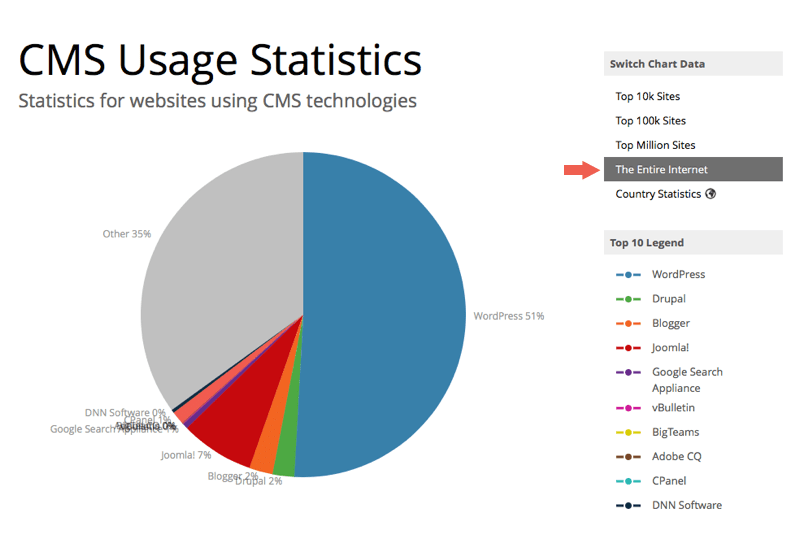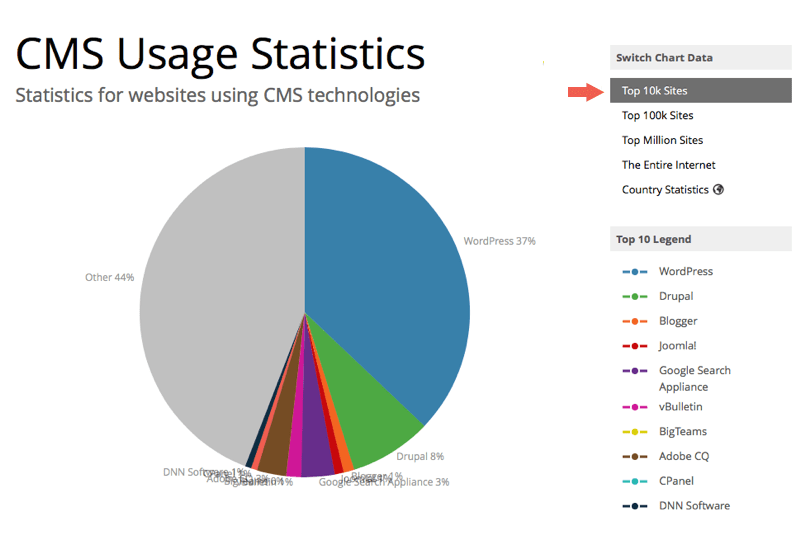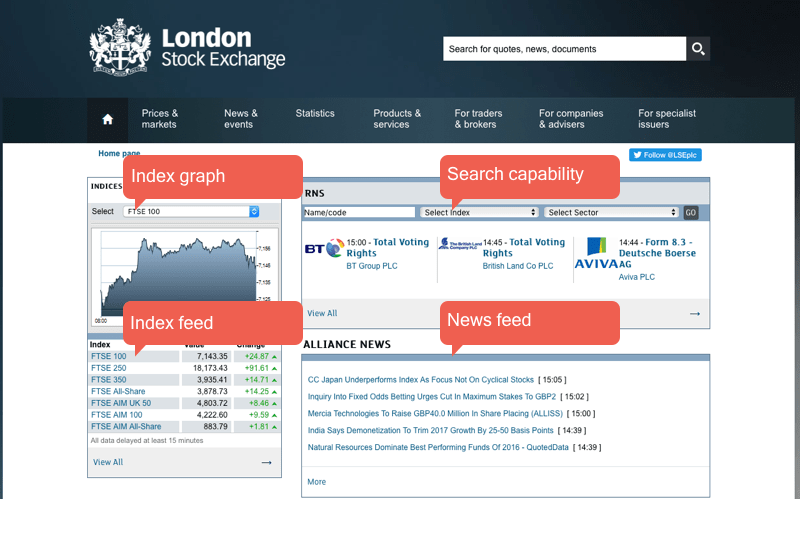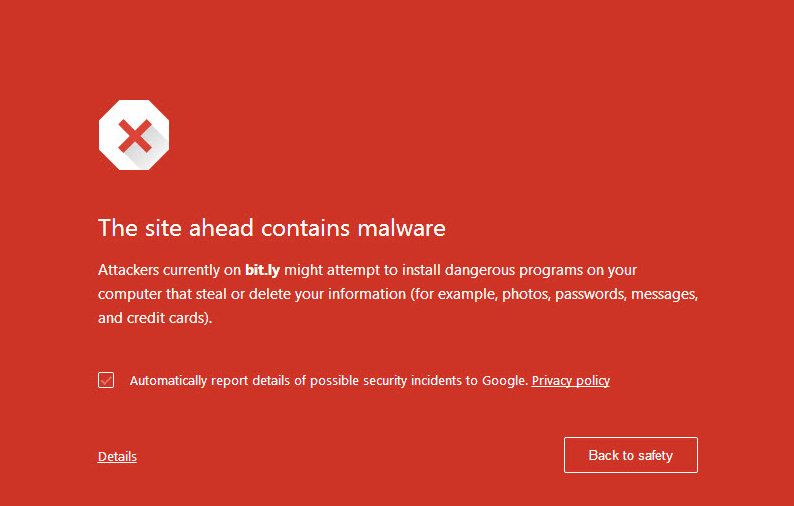
It is a fairly well-known fact that the majority of the world’s websites are powered by WordPress. A quick look at the diagram by BuiltWith confirms this (please note “The Entire Internet” filter on the right).

However, once we adjust the filter to consider only “Top 10K Sites” (on the right), the diagram begins to look rather different:

As you may see, the more popular a website is, the less likely it is to be built on top of a ready-made CMS. Why is that? The answer lies in the type of users that are attracted to WordPress and other pre-made solutions.
WordPress is indeed the most comprehensive and user-friendly content management system out there. For this very reason, it is popular with amateur bloggers, semi-professional writers, purely informational sites, and similar categories of users.
Indeed, launching a WordPress site may cost little money, and it is the way to go when you don’t need anything fancy. At the same time, many business-driven websites avoid the CMS for a number of reasons.
So, when would you rather not use WordPress or another ready-made system?
1. You have an enterprise-scale business
They say that every business is a software business nowadays. The bigger the company, the more likely it is to be underpinned by a complex IT infrastructure of databases, business applications, public apps, APIs, etc.
For large organizations, trying to adjust a cookie-cutter CMS to an enterprise system is akin to fitting a square peg into a round hole.
For instance, let us consider online properties like London Stock Exchange. It’s hard to imagine that WordPress would take care of incorporating data from so many sources out of the box:

In the above example, the homepage is just the tip of the iceberg. Behind the scenes, it is powered by a massive back-end that feeds data into just the right slots on the page.
2. Security is a priority to you
In addition to being the world’s most-used CMS, WordPress is also the world’s most-hacked system.
As a rule, large businesses simply cannot afford the risk. Not only can a security breach damage your company’s reputation, but it may also lead to your site being removed from Google’s index.
Below is the message that visitors see when they proceed from Google onto a hacked site:

Sometimes, it takes days for the information about a new security risk to reach the masses, and yet another couple of days for the CMS provider to act on it.
In addition, an updated version of the CMS often turns out to be incompatible with at least some installed plugins, and fixes need to be made to implement the latest patches.
At the same time, if you have a dedicated development team supporting your custom CMS, you can depend on them to patch up your system within 24 hours.
3. Timely and streamline upgrades are important to you
Most pre-made content management systems are plugin-based. This means, they rely heavily on plugins for extra functionality. More often than not, this makes keeping the CMS updated rather difficult.
There are many reasons to upgrade to the latest version of the CMS. Sometimes, you’d want to upgrade for security reasons, and, sometimes, it’s because a higher version has functionality or performance improvements that you wish to receive.
By contrast, with a custom CMS, you can make changes and introduce enhancements in short, quick iterations – there’s no need to wait for the CMS provider to make them available to you.
4. You have strict performance requirements
With a template-based CMS, you have little control over the performance of the core system and the plugins you use. Optimizing for performance then becomes the CMS provider’s job; usually offering a normalized solution that meets the average user’s needs.
But what if your website is above average (in terms of traffic, number of integrations and UX standards)? Then welcome to performance optimization hell.
The majority of ready-made themes fall short when checked for compliance with modern standards for speed, UX and responsiveness. Again, then you’re stuck with a limited selection of themes that perform well, and there is no guarantee that a particular RWD theme will still be supported in a year from now.
Of course, you can always write a custom theme. In fact, you can customize everything in a ready-made CMS. But wouldn’t it then be easier to create a CMS from scratch?
5. Flexible roles and permissions are required
Most template-based CMSs offer a basic set of admin panel user roles (admin, editor and author are the norm for a simple blog). However, this often becomes a stumbling stone for businesses that need more diversity and flexibility in this respect.
As a rule, large organizations have multiple departments, employees, contractors, partners, etc. And many of these entities should be given custom access to the CMS.
For example, sometimes you’d want to hide a particular button from everyone except for a head of department. Or you’d need to give access to a localized section of your CMS – it depends.
Another question is login and password data, which is a separate dimension in the roles and permissions universe altogether.
For one of our clients, we at ObjectStyle have implemented the single sign-on system. The client’s employees can use the same login details across all digital properties. This is, of course, more convenient than having a separate login and password for the CMS.
6. Fast and responsive support is a necessity
A ready-made CMS often either leaves you with a lack of proper support, or forces you to roam help forums in search of answers.
On the contrary, a custom CMS is, as a rule, continuously supported by the vendor that developed it, and you can contact the said vendor about any question at any time.
7. You have special content requirements
An out-of-the-box CMS such as WordPress comes with default content templates (blog posts, side widgets, sharing buttons, etc.) While you can achieve many things with these templates, sometimes it is really tough to find the exact solution you need.
For example, imagine that you run a Eurovision Song Contest website, and you need things like country profiles, participant profiles, leader boards and ratings, dedicated artist pages, etc. It is much easier to create these entities from scratch than to look for appropriate plugins in a pre-made CMS.
Wrapping it up
Okay, we have described typical reasons that could drive a company to create a custom content management system. Of course, these are not imperatives, and, even if you agree with the majority of the above statements, it doesn’t necessarily mean you need a custom-tailored CMS.
In the end, the moment of truth comes when you estimate how much it will cost you to customize an out-of-the-box solution vs creating a right-sized CMS from scratch.